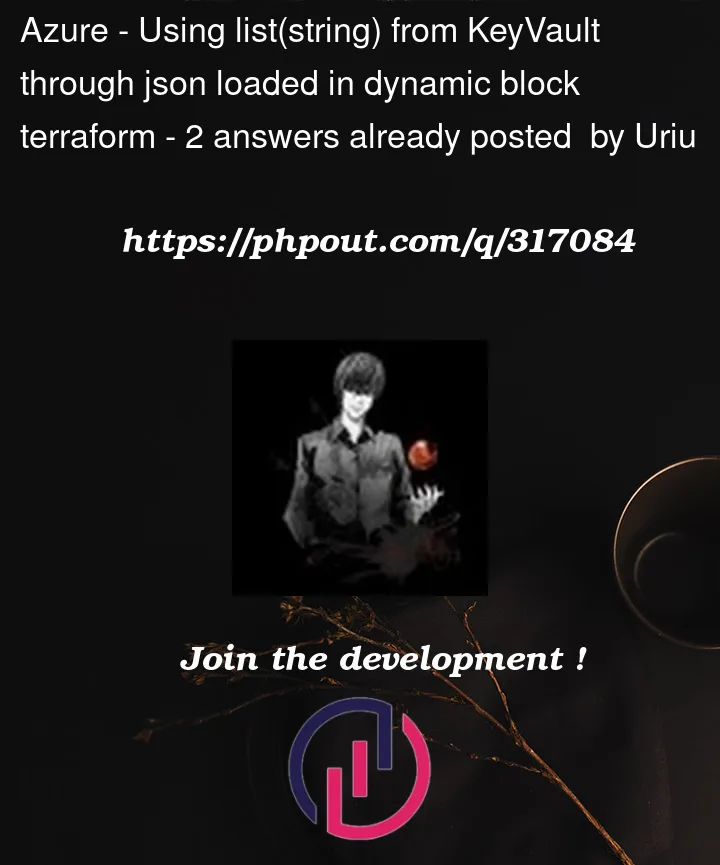I’m loading json from Azure KeyVault and convert with jsondecode().
While raw string is working, when I load the same string from KeyVault I cannot use it in dynamic Block.
Error: Invalid dynamic for_each value
Cannot use a tuple value in for_each. An iterable collection is required.
Working
resource "azurerm_monitor_action_group" "SIDevelopment" {
name = "Test"
resource_group_name = "kv-test"
short_name = "Test"
dynamic "email_receiver" {
for_each = jsondecode("["[email protected]","[email protected]"]")
content {
name = email_receiver.value
email_address = email_receiver.value
use_common_alert_schema = false
}
}
}
Not Working
data "azurerm_key_vault" "this" {
name = var.key_vault_name
resource_group_name = var.resource_group_name
}
data "azurerm_key_vault_secret" "secret" {
name = var.secret_name
key_vault_id = data.azurerm_key_vault.this.id
}
resource "azurerm_monitor_action_group" "SIDevelopment" {
name = "Test"
resource_group_name = "kv-test"
short_name = "Test"
dynamic "email_receiver" {
for_each = jsondecode(data.azurerm_key_vault_secret.secret.value)
content {
name = email_receiver.value
email_address = email_receiver.value
use_common_alert_schema = false
}
}
}
When I try to compare results they are looks equal
output "kv"{
value = jsondecode(data.azurerm_key_vault_secret.secret.value)
sensitive = true
}
output "string"{
value = jsondecode("["[email protected]","[email protected]"]")
sensitive = true
}
after read output as json
{
"kv": {
"sensitive": true,
"type": [
"tuple",
[
"string",
"string"
]
],
"value": [
"[email protected]",
"[email protected]"
]
},
"string": {
"sensitive": true,
"type": [
"tuple",
[
"string",
"string"
]
],
"value": [
"[email protected]",
"[email protected]"
]
}
}
I’ve try toset, tolist, etc.
And still can’t figure out why string from KeyVault behave differently.




2
Answers
It's was just a missing
nonsensitivefunctionfor_each = jsondecode(nonsensitive(data.azurerm_key_vault_secret.secret.value))
So to make it work it I've replace code to be like this
It seems that your scenario does not support using
for_eachwith an object (map) that is derived from a list. This is uncommon, as usually this conversion from a list to a map with indices as keys should be successful. However, there may be some particularities in your situation that trigger this problem.For this case I suggest
countis a better choice thandynamic foreachfor your task of looping through a simple list of email addresses.countis easy to use for lists that have a fixed order and don’t require individual labels for each item.Before you configure anything, verify that the JSON data in the Azure Key Vault consists of a list of email addresses in this format:
["[email protected]", "[email protected]", ...].My demo terraform configuration:
Output: